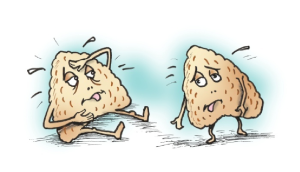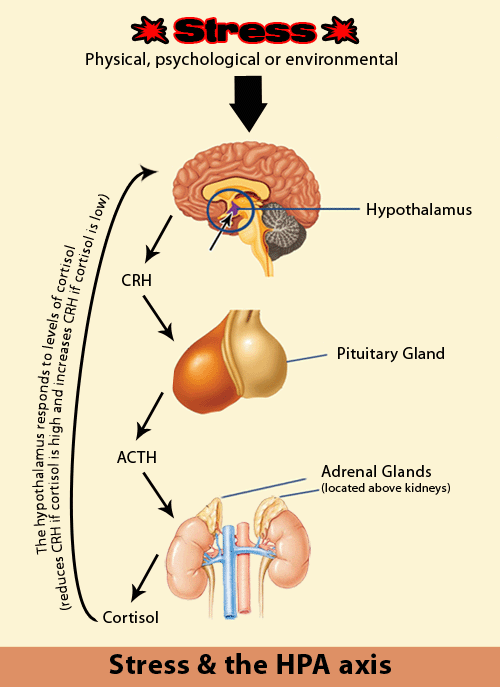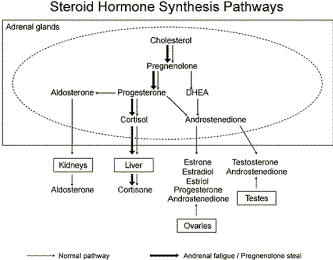From Fabulous to Fatigued: Why are we all so tired?
Categories: Endocrinology, Health & Nutrition, Scientific Evidence & Research
Pop quiz time! When you think fatigue, weight gain, thinning hair and feeling cold, what disease process comes to mind? I often see patients with this constellation of symptoms who ask for in-depth thyroid testing because they are absolutely sure they have hypothyroidism. We draw labs, and to the patient’s surprise, the labs are normal. “But that can’t be! Every symptom I have fits!” It turns out that these are all also symptoms of another disease process called adrenal fatigue. Historically, the conventional medical community hasn’t recognized adrenal fatigue as a true disease. There are several reasons for this, including limitations of laboratory tests, zero or limited training in medical schools on the topic, and no interesting (read: profitable) drugs that are necessary for treatment. This is why, when you go to see your family physician and ask about adrenal fatigue as a possibility of your symptoms, you may get some funny looks and a prescription for an anti-depressant. Lame! Adrenal fatigue is becoming more and more common, however- why is this? I recently read Adrenal Fatigue: The 21st Century Stress Syndrome by James L. Wilson, N.D., D.C., PhD., who is considered a leading expert on the topic, to better inform myself, and many of Dr. Wilson’s ideas will be summarized below.
First off, I should explain what exactly an adrenal gland is and why it is so important. The adrenals are cute little hormone sacs that sit comfortably atop the kidneys. They secrete many different hormones, including epinephrine, DHEA and pregnenolone, which, among other things, are precursors to your sex hormones (progesterone, estrogen, testosterone), and of course cortisol. Almost everything in the endocrine system works on a feedback loop. The loop we’re going to discuss is illustrated here:
Basically, if there is not enough circulating cortisol to handle the stress you’re under, this signals the hypothalamus in the brain to produce Corticotropin Releasing Hormone (CRH), which in turn tells the pituitary gland, also in the brain, to secrete Adrenocorticotropic Hormone (ACTH), which (Big finish! Jazz hands!) ultimately tells those adrenal glands to pump out more cortisol. For awhile, this works well, allowing you to feel energetic and occasionally even jittery. Over time, however, those poor little adrenal sacs are sick of the constant barrage from your stress and can no longer function. Sad sacs, indeed! Cortisol works by protecting the body from whatever is stressing it out. It does so by affecting blood glucose and blood pressure, affecting electrical activity in the nervous system, helping to control inflammation, and regulating the immune system. Obviously if the adrenals are not functioning properly, this can affect many areas of your health!
What causes adrenal fatigue in the first place? Anything that causes emotional or physical stress has the potential to cause adrenal fatigue. This includes chronic infections, over exercising/overtraining, toxin exposure, poor diet, and tobacco use. It may only take one acute stressor or it may be a slow process over a number of years from chronic stress, but as you can see, there are many potential causes of adrenal fatigue. Some symptoms were mentioned above, but here is a more inclusive list:
- Ongoing fatigue, does not improve with rest
- Salt/refined carbohydrate cravings
- Lethargy/weakness
- Low libido
- Decreased ability to handle stress/frequently feeling stressed
- Poor or slow recovery from illness
- Becoming lightheaded upon standing
- Mild depression/anxiety
- Increased PMS
- Requiring frequent snacks or caffeine to keep energy levels up
- Decreased mental clarity/worsening memory
- Tired all morning/afternoon, energetic in the evening
- Poorly controlled blood sugars (hypo/hyperglycemia)
- Weight changes
- Cold intolerance
- Thinning hair
Since we know that the conventional medical establishment often does not recognize adrenal fatigue as a true condition, how can it be diagnosed? Many functional medicine providers have started performing various labs to assess for adrenal fatigue. One test that’s gaining popularity is a saliva test called an Adrenal Stress Profile– you basically spit into a tube 4 times in a day to collect salivary cortisol levels. Easy peasey, lemon squeezy! We have recently started performing this test in our office through Genova labs. It seems to detect abnormalities in even subtle cases of adrenal fatigue. Other options for testing include a 24-hour urine cortisol test and a blood test called an ACTH challenge. These are the tests that have been used for many years in conventional medicine, and will generally only be abnormal if the adrenal fatigue is quite severe. The ACTH challenge works like this: ACTH is given to the patient with the expectation that it will cause a release of cortisol in the bloodstream. If this does not occur, it’s a sign that the adrenals are no longer able to secrete enough cortisol to keep you feeling like a functioning human. Darnit.
But wait! All hope is not lost! There are actually numerous ways to treat adrenal fatigue, but it takes dedication and often significant lifestyle changes to heal the adrenals. (“Oh, NO, she’s NOT asking me to make lifestyle changes AGAIN! Double darnit.”) It’s fairly easy to take a new medication or supplement, but reducing stress in our lives takes practice. I wrote a post awhile back on stress (see Monkey Monkey Underpants post from July 2013), which has some helpful tips on how to reduce stress in our everyday lives. This is absolutely your first task if you feel your adrenals are shot. Second, make sleep a priority. Sleep is not a luxury, people, it’s a necessity, and the adrenals will not heal without adequate rest. After this, look at your diet and exercise regimen. The diet should consist primarily of unprocessed, whole foods, and plenty of healthy fat. Though dietary cholesterol does not significantly affect the amount of cholesterol produced in the body, make sure to get in some cholesterol rich foods such as eggs- cholesterol is the precursor to all steroid hormones as seen here, and without it, it’s harder to recover.
Stimulants, such as caffeine and chocolate should be avoided for awhile as these tax the adrenals even more. (Go ahead and throw tomatoes at your screen. I know you’re upset.) You may also need to use a good quality sea salt on foods and even in water throughout the day. Those that overdo the cardio (i.e. >45 minutes running/stairmaster, etc, multiple days/week) should reduce it in favor of weightlifting, walking, and gentle yoga, as exercise is a stressor to the body. There are also several supplements, including B vitamins, Vitamin C, and adaptogenic herbs (plants that may help decrease cellular sensitivity to stress) that can help as well for mild to moderate cases, and medication for the most severe cases; however, I recommend testing prior to taking supplements or medications for this issue.
If you think you may be suffering from adrenal fatigue, come discuss your symptoms with us and we’ll get you tested to determine the most appropriate treatment regimen, or if you’re not in the area, seek out a functional medicine provider who is knowledgeable in the topic. I would also highly recommend reading Dr. Wilson’s book to jumpstart your treatment and start feeling better! Who wants to feel fatigued when you could get back to feeling like your fly, fabulous self? Shazam! Fabulous, indeed.
~Erynn



